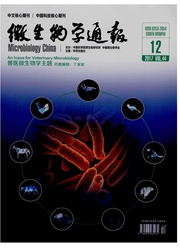

 中文摘要:
中文摘要:
通过PCR、克隆文库方法分析了农业有机废物和城市垃圾堆肥高温期间细菌和真菌种群的多样性。提取堆肥高温期的DNA,PCR扩增,构建各高温期的16SrDNA和18SrDNA克隆文库,结果表明:农业有机废物和城市生活垃圾16SrDNA克隆文库中分别共有18个、21个OTUs,分别属于细菌域的14个、15个不同属,其18SrDNA克隆文库中分别共有8个、9个OTUs,分别属于细菌域的8个、9个不同属,推断农业有机废物堆体的优势菌为Bacillus megaterium、Rhizobium sp.、Phanerochaete chrysosporium、Penicillium sp.同属或同种的菌株;城市生活垃圾堆体的优势菌为Bacillus megaterium、Azospirillum sp.、Phanerochaete chrysosporium同种或同属的菌株。
 英文摘要:
英文摘要:
Microbial diversity of composting of agriculture organic wastes (AOW) and municipal domestic waste(MDW) in the thermophilic(T) phase was analysed by Polymerase Chain Reaction(PCR) combined with constructing of clone library. The polymerase chain reaction-amplified 16S rDNA and 18S rDNA fragments with universal eubacterial primers(27F, 1495R) and fungal primers(EF4, Fung5) were subjected to constructing of clone library, and the results of clone library indicated: there were 18 OTUs and 21 OTUs in the 16S rDNA clone library of AOW and MDW composting sample, and they belonged to 14 and 15 different genuses respectively; in the 18S rDNA clone library of AOW and MDW composting sample, there were 80TUs and 90TUs, and they belonged to 8 and 9 different genuses respectively. The dominant microbes in the T phase of composting of AOW were related to Bacillus megaterium, Rhizobium sp., Phanerochaete chrysosporium, Penicillium sp., and the dominant microorganisms in the T phase of composting of MDW were related to Bacillus megaterium, Azospirillum sp. and Phanerochaete chrysosporium.
 同期刊论文项目
同期刊论文项目
 同项目期刊论文
同项目期刊论文
 Effect of ligninolytic enzymes on lignin degradation and carbon utilization during lignocellulosic w
Effect of ligninolytic enzymes on lignin degradation and carbon utilization during lignocellulosic w Oxalate production at different initial Pb2+ concentrations and the influence of oxalate during soli
Oxalate production at different initial Pb2+ concentrations and the influence of oxalate during soli Transfer of heavy metals from compost to red soil and groundwater under simulated rainfall condition
Transfer of heavy metals from compost to red soil and groundwater under simulated rainfall condition Mycelial growth and solid-state fermentation of lignocellulosic waste by white-rot fungus Phanerocha
Mycelial growth and solid-state fermentation of lignocellulosic waste by white-rot fungus Phanerocha Changes of microbial population structure related to lignin degradation during lignocellulosic waste
Changes of microbial population structure related to lignin degradation during lignocellulosic waste Influence of Phanerochaete chrysosporium on microbial communities and lignocellulose degradation dur
Influence of Phanerochaete chrysosporium on microbial communities and lignocellulose degradation dur Degradation of lead-contaminated lignocellulosic waste by Phanerochaete chrysosporium and the reduct
Degradation of lead-contaminated lignocellulosic waste by Phanerochaete chrysosporium and the reduct Modeling research on the sorption kinetics of pentachlorophenol (PCP)to sediments based on neural ne
Modeling research on the sorption kinetics of pentachlorophenol (PCP)to sediments based on neural ne Spatial analyzing system for urban land use management based on GIS and multi-criteria assessment mo
Spatial analyzing system for urban land use management based on GIS and multi-criteria assessment mo Simulation-basedoptimization of dual-phase vacuum extraction to remove nonaqueous phase liquids in s
Simulation-basedoptimization of dual-phase vacuum extraction to remove nonaqueous phase liquids in s An integrated simulation , inference, and optimization method for identifying groundwater remediatio
An integrated simulation , inference, and optimization method for identifying groundwater remediatio Optimization of Surfactant-Enhanced Aquifer Remediation for a Laboratory BTEX System under Parameter
Optimization of Surfactant-Enhanced Aquifer Remediation for a Laboratory BTEX System under Parameter A fuzzy-set approach for addressing uncertainties in risk assessment of hydrocarbon-contaminated sit
A fuzzy-set approach for addressing uncertainties in risk assessment of hydrocarbon-contaminated sit Seasonal Dry Deposition and Canopy Leaching of Base Cations in a Subtropical Evergreen Mixed Forest,
Seasonal Dry Deposition and Canopy Leaching of Base Cations in a Subtropical Evergreen Mixed Forest, Combining AHP with GIS in synthetic evaluation of eco-environment quality —a case study of Hunan Pro
Combining AHP with GIS in synthetic evaluation of eco-environment quality —a case study of Hunan Pro Simulation-Based Process Optimization for Surfactant-Enhanced Aquifer Remediation at Heterogeneous D
Simulation-Based Process Optimization for Surfactant-Enhanced Aquifer Remediation at Heterogeneous D Modeling and measurement of two-layer-canopy interception loss in a subtropical mixed forest of cent
Modeling and measurement of two-layer-canopy interception loss in a subtropical mixed forest of cent NRSRM: A Decision Support System and Visualization Software for the Management of Petroleum-Contamin
NRSRM: A Decision Support System and Visualization Software for the Management of Petroleum-Contamin Application of Bayesian Regularized BP Neural Network Model for Trend Analysis, Acidity and Chemical
Application of Bayesian Regularized BP Neural Network Model for Trend Analysis, Acidity and Chemical Estimation of Exchange of Proton and Major Elements in Two-layer Canopies under Acid Rain in a Subtr
Estimation of Exchange of Proton and Major Elements in Two-layer Canopies under Acid Rain in a Subtr EFFECTS OF WEAK ACIDS ON CANOPY LEACHING AND UPTAKE PROCESSES IN A CONIFEROUS-DECIDUOUS MIXED EVERGR
EFFECTS OF WEAK ACIDS ON CANOPY LEACHING AND UPTAKE PROCESSES IN A CONIFEROUS-DECIDUOUS MIXED EVERGR Deposition patterns in bulk precipitation and throughfall in a subtropical mixed forest in, Central-
Deposition patterns in bulk precipitation and throughfall in a subtropical mixed forest in, Central- Application of Bayesian regularized BP neural network model for analysis of aquatic ecological data-
Application of Bayesian regularized BP neural network model for analysis of aquatic ecological data- 湖滨湿地生态系统稳定性评价(Analysis of ecological benefit of ecological restoration of aquatic –terrestrial everg
湖滨湿地生态系统稳定性评价(Analysis of ecological benefit of ecological restoration of aquatic –terrestrial everg 期刊信息
期刊信息
